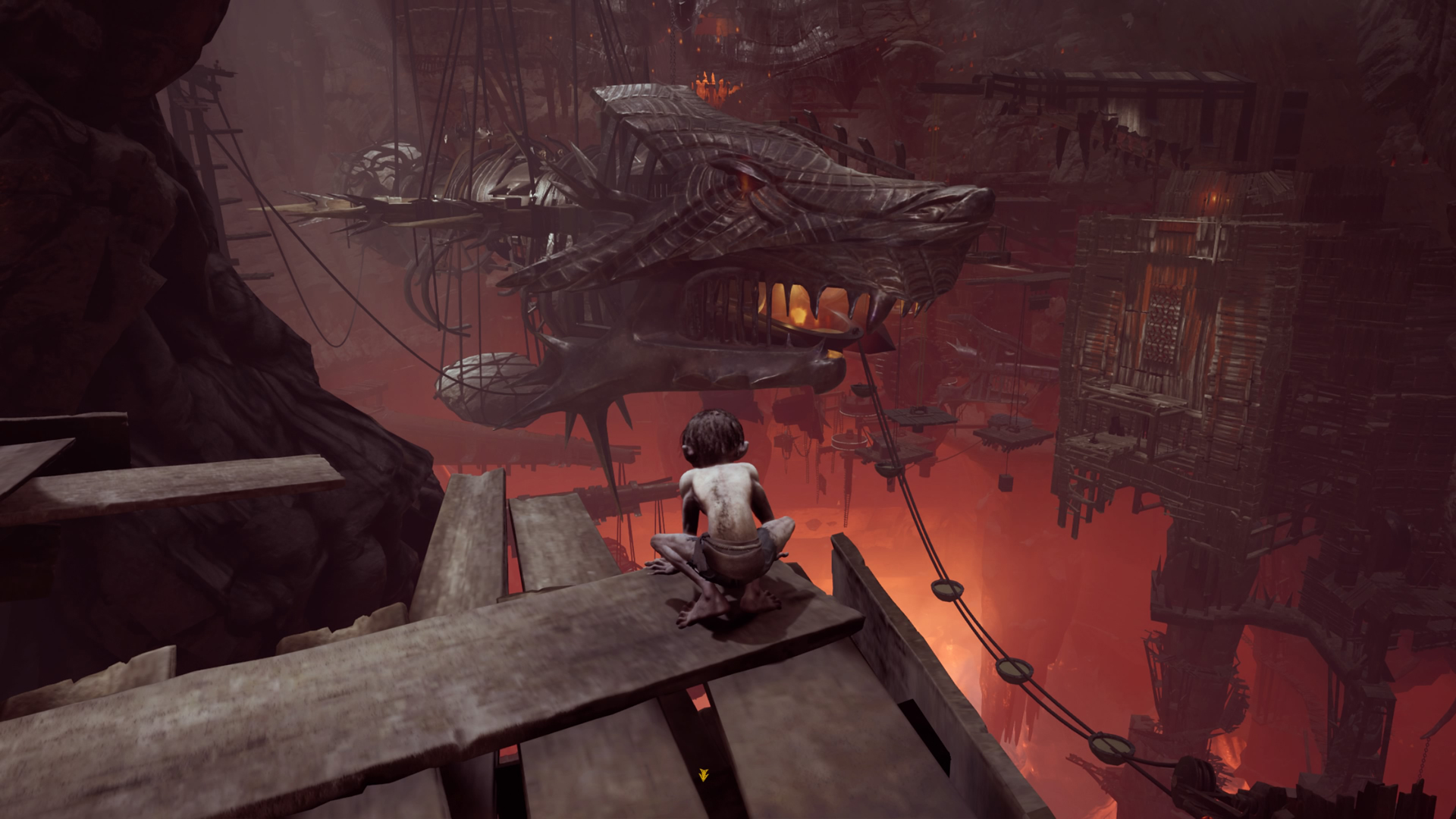GamesRadar+ Verdict
Much like its title character, The Lord of the Rings: Gollum is compromised, inelegant, and a bit of an eyesore. To everyone except the most fervent of Tolkienites; you shall pass.
Pros
- +
Some interesting embellishments to Middle-Earth lore
- +
Unique exploration of Gollum's character
Cons
- -
Flat, awkward visuals
- -
Wooden performances
- -
Shallow, buggy stealth gameplay
Why you can trust GamesRadar+
Deep in the blackened bowels of Barad-Dur, a great evil is brewing. Sauron's army grows with every passing day, as the Dark Lord's piercing eye surveys the lunar wastelands of Mordor for his prized possession – the Ring of Power: one ring to rule them all. It's far from his clutches for now, but Sauron intends to draw it out soon enough, setting a great war into motion, one in which the very fate of Middle-earth is at stake.
Developer: Daedalic Entertainment
Publisher: Nacon
Platform(s): PS5, PS4, PC, Xbox Series X, Xbox One
Release date: May 25, 2023
But that's a tale for another day. Instead, the one I'm playing currently involves herding Borocs into a pen via a minigame that feels (and, unfortunately, looks) like something you'd expect to play in a title released two generations ago. Not only that, but these bug-eyed beasts are sadly as stupid as they look, barely registering my presence until I'm right in front of their sightlines, and even then, it's touch-and-go as to whether they actually start galumphing towards me, or get stuck in a clipping war against the ground. It's an awkward experience, to say the least, but running up against these types of bizarre, broken sequences that add little value to the overall texture of Tolkien's fantasy are sadly far too common an occurrence in The Lord of the Rings: Gollum.
Developer Daedalic was always going to have a hard time justifying why audiences needed to know what its titular character was up to in the events preceding The Fellowship of the Ring, but throw in off-putting visuals, shallow gameplay, and a litany of bugs, and The Lord of the Rings: Gollum offers an experience that's not so much an unexpected journey as it is one to avoid altogether.
Muddled-earth
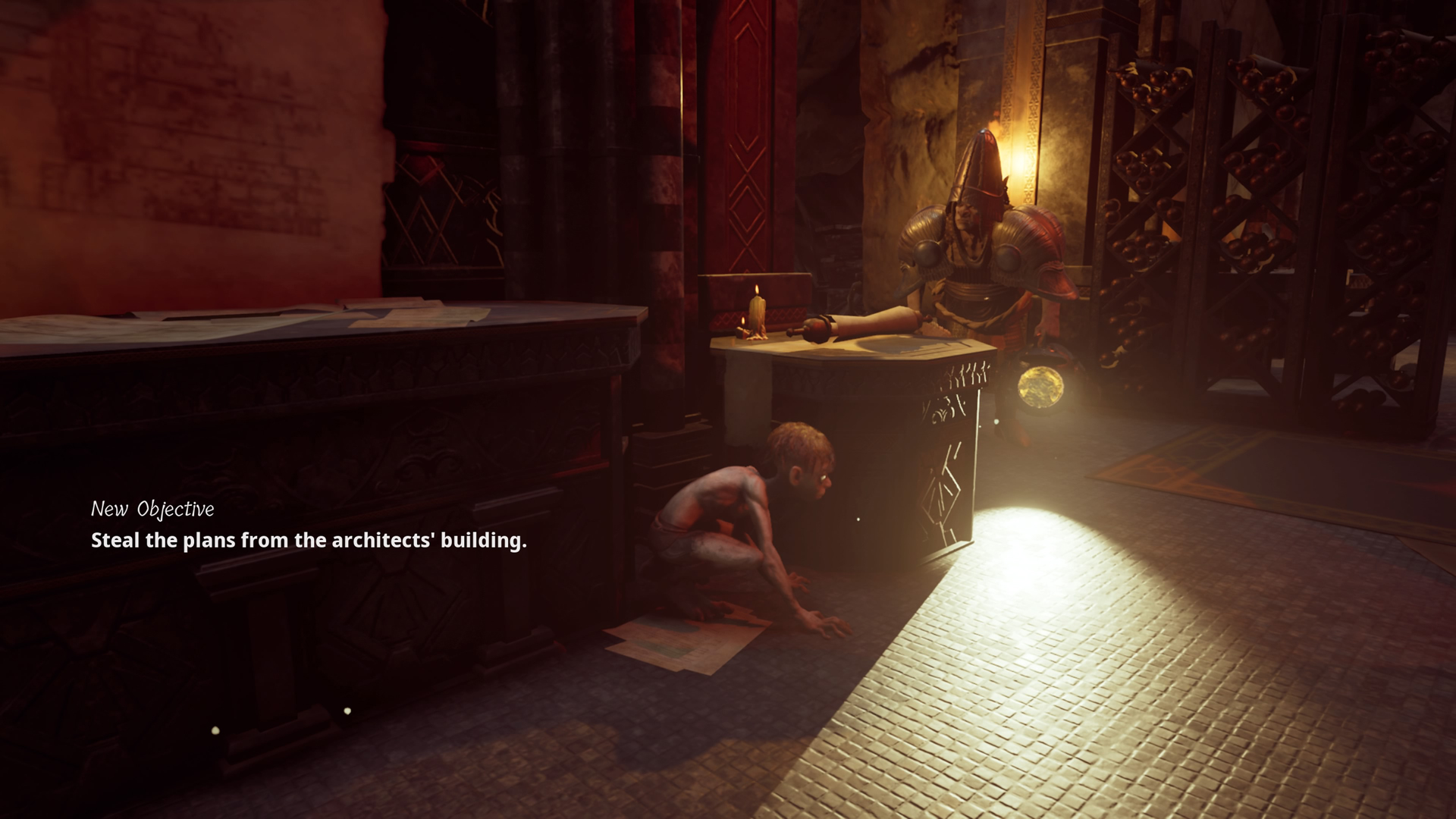
To its credit, Daedalic does, at least, demonstrate a clear fondness for, and familiarity with, Tolkien's source material. Bookending its original tale with Gollum's two imprisonments under Sauron and the Elves of Mirkwood respectively, the developer uses this structure to clever effect in places, with Gandalf's interrogation of Gollum serving as a helpful framing device for its opening chapter, their conversation overplaying much of the action within.
Daedalic also brings its own contributions to Middle-earth in the form of new characters that feel more or less at home with the rest of the cast, such as The Inquisitor, a suitably villainous right hand man to The Mouth of Sauron feared by orcs and humans alike. Even so, that doesn't stop the story from feeling largely directionless and negligible at times. Until Gollum meets Sam and Frodo in Tolkien's books, he operates mostly as a passive observer of, and victim to, events around him, and the game's plot reflects this lack of agency, colouring in the gaps of his backstory with low-stakes contextual filler involving a lot of prison labour drained of narrative momentum.
Thankfully, even if The Lord of the Rings: Gollum doesn't land as a compelling chapter in the tapestry of Middle-earth's history, the game can still hold interest as a character study of its tragically corrupted protagonist. This is partly due to Daedalic adopting a more sympathetic view of Gollum than other adaptations have, exploring the suffering that the deformed Hobbit has endured under those who too often underestimated him, and even giving him a few friendlier faces to bond with along the way. Some of this characterisation doesn't always quite correlate with the feistier, more manipulative Gollum that many of us are more accustomed to, but it's certainly a unique perspective that allows you relate to him a little better over the course of the game's two dozen hour runtime.
It also helps that you have a certain degree of freedom to lean into either side of the character's dual personality, too, offered via dialogue options or even full-blown internal arguments between Gollum and Sméagol, where one must convince the other of how to proceed. These choices result in some minor plot changes, but are more interesting as a way for you to determine the balance between Sméagol and his ring-corrupted alter ego, while also illuminating some of the more nuanced dimensions to both. Gollum may be the cruel Mr. Hyde of the two personalities, for example, but his cynicism often carries a lot of self-preservational common sense that Sméagol is too naive to even consider.
Weekly digests, tales from the communities you love, and more
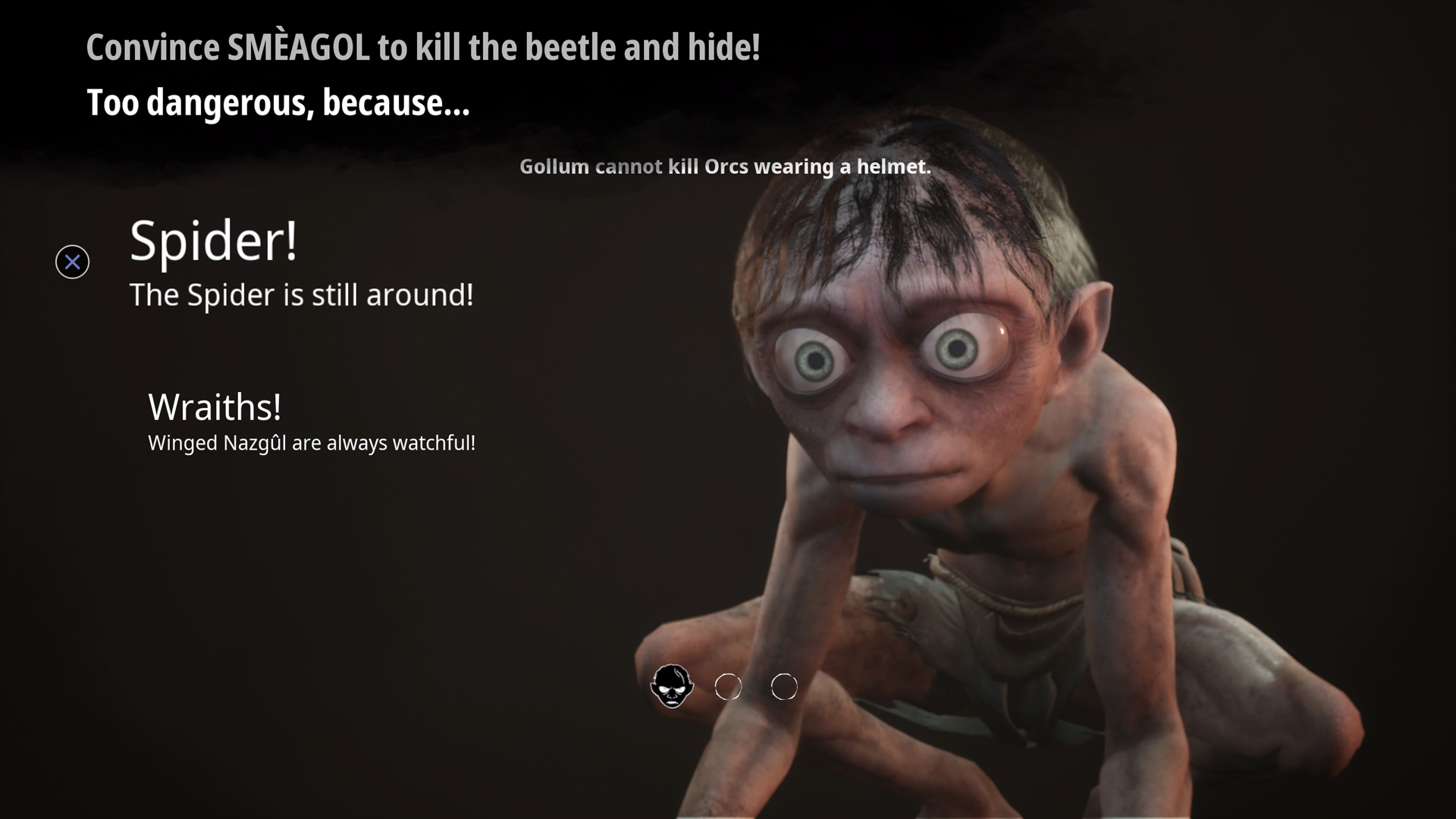
"Even if it wasn't so derivative, Gollum never feels particularly fun to play"
Unfortunately, much of Lord of the Rings: Gollum's writing is undermined in the execution. His voice actor, in particular, takes direct inspiration from Andy Serkis' iconic performance in Peter Jackson's films, but in doing so, only invites himself to unflattering comparisons between the two, right down to his phlegmy "GOLL-um" cough. You end up wishing Daedalic had considered a performance built around a completely new interpretation of the character, but by instead skewing too closely to the one that everyone knows and loves, this Gollum never manages to truly escape Serkis' shadow.
The same can be said for much of Lord of the Rings: Gollum's production value, too, which often feels like a rough-edged facsimile of Tolkien's rich and epic fantasy universe. This is largely down to the fact that The Lord of the Rings: Gollum is not a good looking game. Characters appear flat and lifeless, vistas are murky and lacking in detail, and textures are so drab and washed out, you can easily be mistaken into waiting for them to pop in with a sharper resolution that never arrives.
And while Daedalic's sympathy for Gollum extends to his design, dialling down the creep factor in favour of a more boyish and baby-faced alternative, the character's animations are usually just as unconvincing as his voice, and almost laughably off-putting in places. It's no secret that a large part of what made Gollum land as a character in The Lord of the Rings movies was the dedicated motion capture and animation work that helped bring him to life, and the comparative dearth of it here is impossible to ignore, with Gollum's dialogue and facial expressions never quite correlating authentically with each other. The overwhelming result of all of these compromises is a muddy, miserly vision of Middle-earth, and one which never truly connects as a compelling fantasy playspace.
Shadows of Mordor
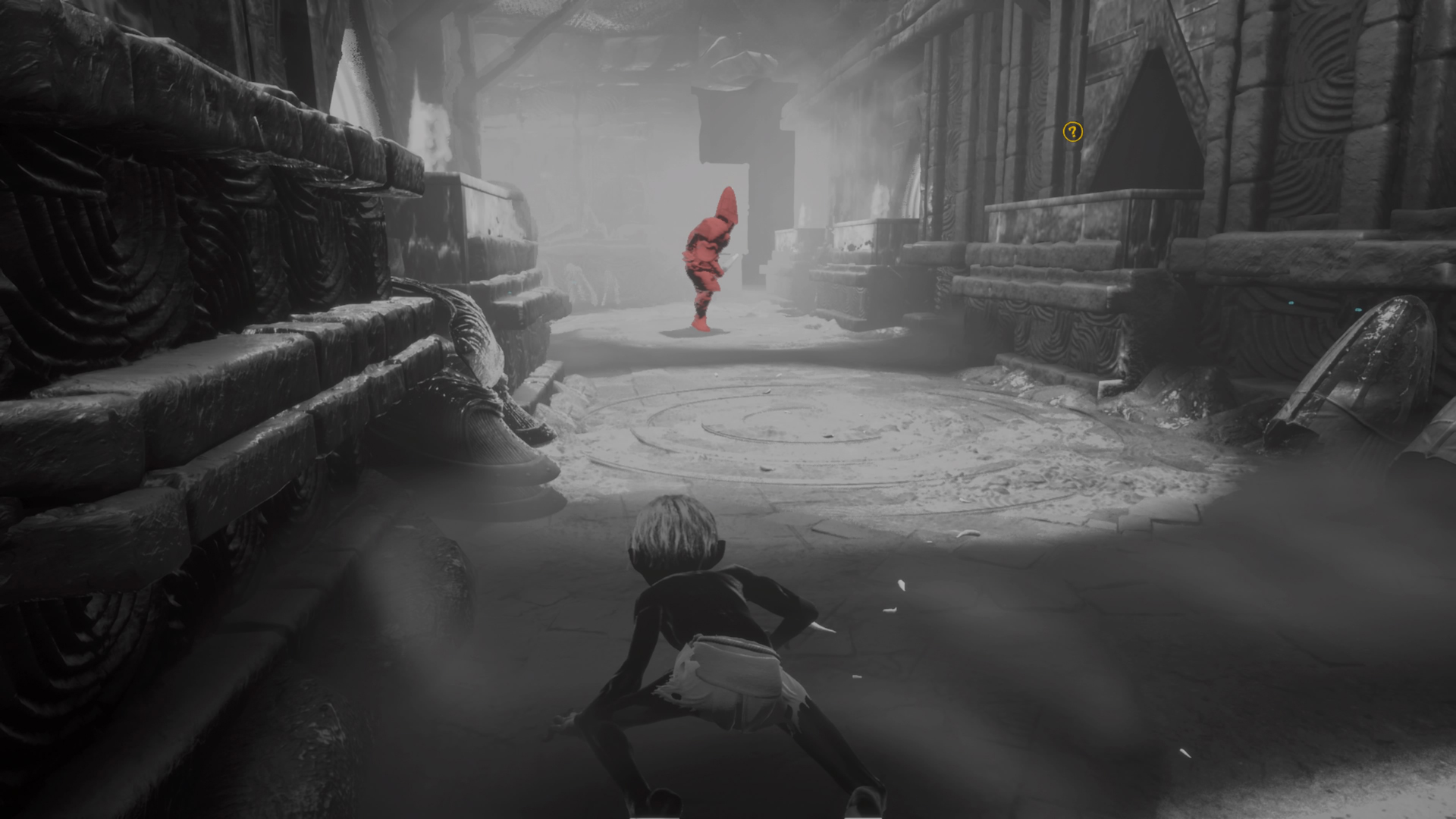
Perhaps The Lord of the Rings: Gollum's lack of polish would be less of an issue if its gameplay left a better impression, but unfortunately much of it boils down to standard stealth-platformer fare frustrated further by wonky controls and hapless AI. Gollum will spend much of his time sneaking past orcs, elves, and other enemies in order to progress through levels of various size and structure, but the first red flag for the game's awkward stealth design is the fact that being caught usually results in an instant Game Over state, setting you back to the last checkpoint. Gollum is capable of killing an enemy via a well-timed stealth throttle attack, but doing so takes a long time, and exposes him to potential discovery, making it a wiser choice to instead stay hidden in the shadows, distracting enemies with rocks, climbing around them, or deploying Gollum's stealth vision sense to find the way forward.
It's a blueprint that has been followed plenty of times before in the genre, but even if it wasn't so derivative, Gollum never feels particularly fun to play as, with many simple actions like jumping or throwing a rock feeling wooden and unwieldy to perform. And with no progression tree or new tools to acquire across the game, Gollum's shallow range of abilities stay uniform throughout the entire experience, meaning that the Gollum you start with is pretty much the same one you're controlling by the end. Daedalic does try to spice up level variety beyond simple stealth scenarios, either through distinct missions focused on Gollum's prison life, or the introduction of allies that may be able to help you during certain sequences, but even when the game exhibits more inspired design choices, it's let down by continually frustrating bugs and technical issues.
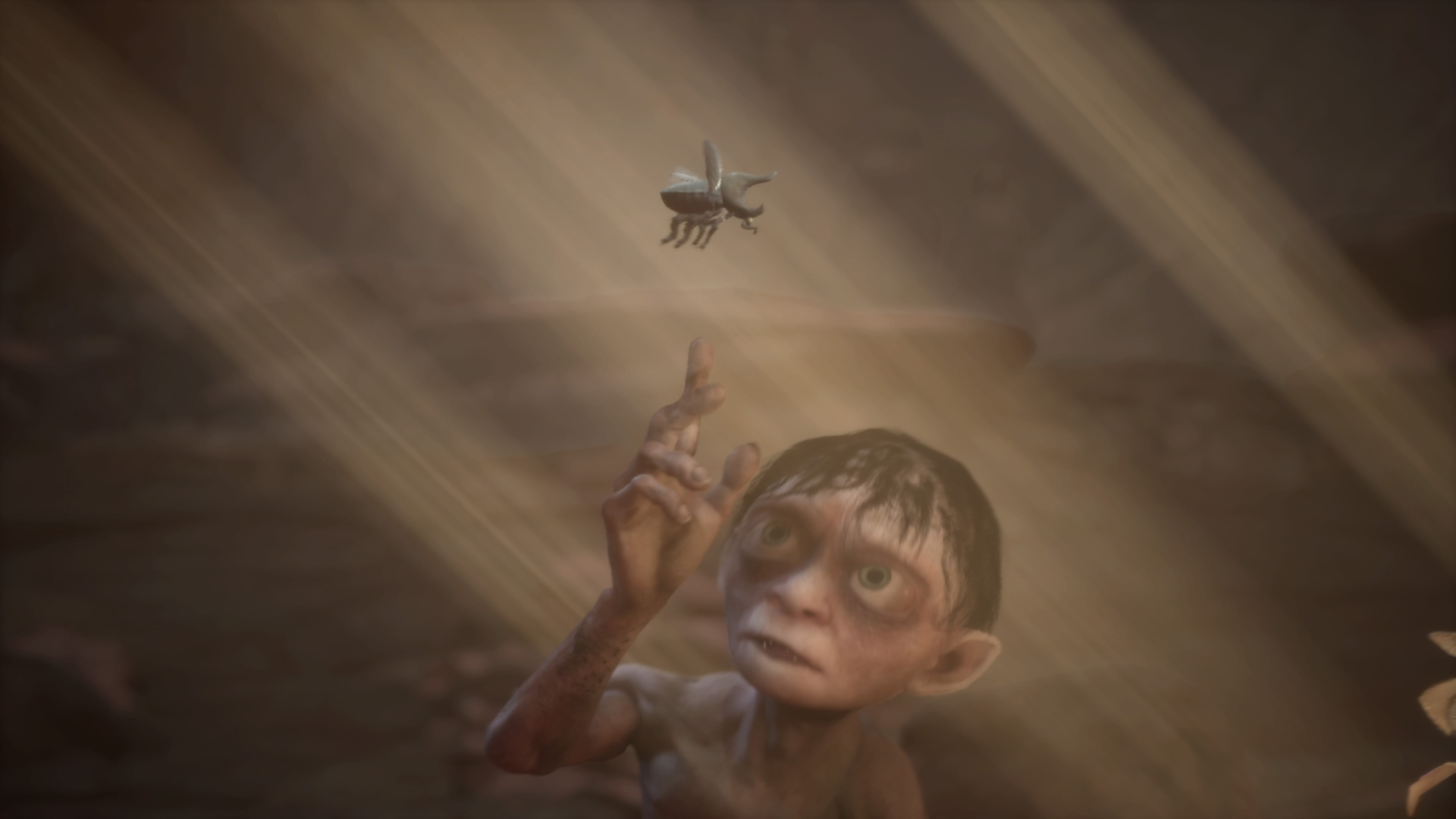
I frequently found myself having to restart a sequence due to something going wrong, whether that be Gollum getting stuck in a menu, or a clipping issue resulting in an unearned Game Over screen. Even when the bugs aren't game-breaking, they're certainly distracting, from characters talking without opening their mouths in cutscenes, to them not showing up in the frame at all thanks to off-kilter camerawork.
Ultimately, it's difficult not to come out of The Lord of the Rings: Gollum with a sour taste in the mouth. You can see glimmers of Deadalic's intent to create a different kind of Lord of the Rings game throughout, particularly in the ways it manifests its unlikely hero's unique psychological state, but those bright spots are quickly lost amidst all the other ways Gollum stumbles in its execution. Perhaps there is a Gollum game that could work at both a narrative and mechanical level, one that reframes our relationship with the iconic character to the point where people think twice before doing their terrible impressions of him at parties. Alas, The Lord of Rings: Gollum is not that game. I'm sorry to say it, but those terrible impressions are here to stay for now.
The Lord of the Rings: Gollum was reviewed on PS5, with code provided by the publisher.
More info
| Genre | Stealth |

Alex is a former Features Writer at GamesRadar, which once made him responsible for gracing the internet with as many of my words as possible, including reviews, previews, interviews, and more. Lucky internet!
